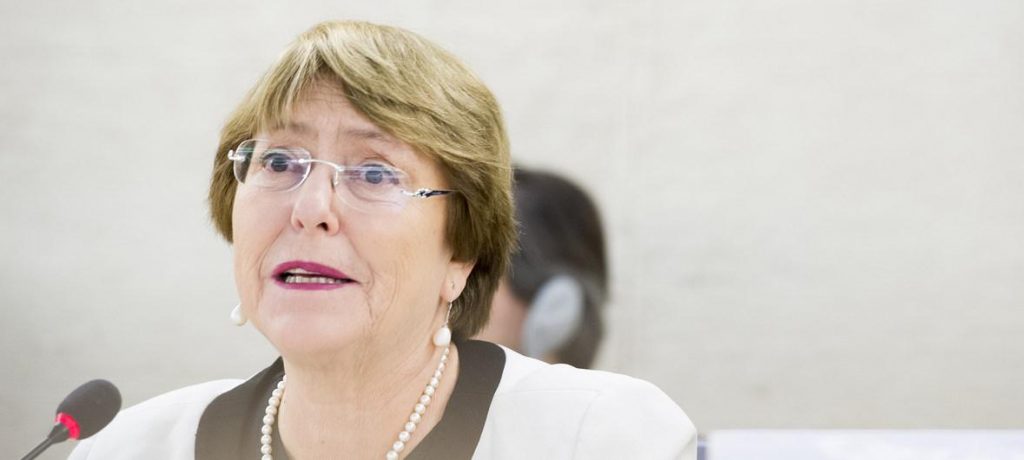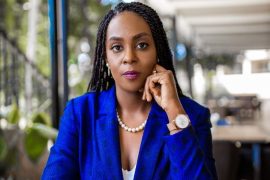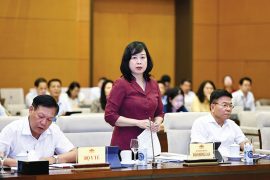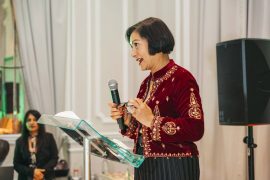In a more than half-hour address to the Human Rights Council, Michelle Bachelet highlighted concerns around the world, while also welcoming several firsts, such as the record number of women now serving in the United States Congress, where they make up nearly a quarter of the representation.
The new wave of women representatives taking up their seats in January indicated several “important steps for diversity,” she said. “They included the first Muslim American Congresswoman, the first Native American Congresswoman, and the youngest woman ever elected to Congress. I hail all powerful women around the world and the model they present to the next generation.”

Moving on to the wider state of social justice around the world, the rights chief said that overcoming “gross inequalities” was key to achieving the 2030 Agenda, referring to the 17 Sustainable Development Goals (SDGs) which Member States signed up to in 2015.
Hailing reforms in Ethiopia – where gender parity has been achieved in government; and Tunisia – where a woman was elected Mayor of the capital Tunis last year, the High Commissioner nonetheless warned that women human rights defenders globally faced a rising number of attacks. These include “physical and sexual violence, public shaming – including on the internet – and attacks on their families and children”, she said.
‘Precarious’ migration proves development gains aren’t universal
Turning to the issue of “involuntary and precarious” migration that affected young people in particular, Ms. Bachelet explained that it too was driven by inequality in the form of poverty, discrimination, oppression, violence, poor governance, climate change – and violations of civil, political, economic, social and cultural rights.
“The continuing movement of people from El Salvador, Guatemala and Honduras to the United States is a result of failure to ensure that development reaches everyone, with persistent violations of rights leading to profound inequalities,” she said.
The High Commissioner also welcomed efforts in Mexico to move from detaining and deporting migrants to a new rights-based approach that focused on “opportunities for regularization and alternatives to detention”.
‘Thousands’ more migrant children separated from families in US
Staying with US-bound migration, Ms. Bachelet cautioned against new restrictions that simply “push migrants back across the border”, while also expressing concern that “thousands more migrant children have been separated from their families than had been previously reported”.
In Europe, the issue of migration was no less dramatic, Ms. Bachelet explained, before welcoming efforts by Germany, Finland, Portugal and Spain to help those fleeing war and persecution.
Continuing reports of migrants leaving the North African coast on unsuitable vessels – and regularly drowning in the Mediterranean Sea – were evidence of the need to extend the scope of regular migration channels, as the European Union had indicated, the High Commissioner said.
“Another 226 deaths were recorded in the first two months of this year,” she said. “With several NGO vessels forced to suspend operations by measures that essentially criminalize solidarity, the ancient responsibility of rescue at sea is increasingly falling on merchant vessels – which are often ill-suited to such a task.”
Philippines war on drugs ‘no model’ for other States
Turning to the Philippines and President Rodrigo Duterte’s war on narcotics, Ms. Bachelet insisted that State policy “should not be more of a threat to their lives than the drugs they are abusing”.
Up to 27,000 people may have been killed in the context of the campaign against illegal drugs since mid-2016, the High Commissioner said. Despite “serious allegations of extra-judicial killings, only one case – the widely reported killing of a teenage boy – has been subject to investigation and prosecution,” she added.
The country’s drug policies were not a model for any country, the High Commissioner maintained, before adding that she was also extremely concerned that Philippino lawmakers were considering “measures to reintroduce the death penalty for drug related crimes and reduce the age of criminal responsibility from 15 to 12 – or even nine-years old.”
Saudi Arabian female activists ‘must be freed’
In a speech covering more than 30 countries, the High Commissioner also appealed to the Kingdom of Saudi Arabia to set free “several” female activists allegedly subject to ill-treatment or torture in jail. “The persecution of peaceful activists would clearly contradict the spirit of the country’s proclaimed new reforms,” she said. “So, we urge that these women be released.”
Yemen conflict will ‘scar’ generations to come
On the huge scale of suffering in Yemen, where fighting between forces loyal to the Government of President Abd Rabbu Mansour Hadi and Houthi militia has claimed thousands of lives since 2015, Ms. Bachelet said that it would “scar the country’s future for generations”.
The conflict has not killed and injured thousands of civilians, bringing famine, “debilitating” airstrikes, shelling, landmines and acute malnutrition – especially for children.
Syrians fleeing ISIL must be given assistance
On Syria, the High Commissioner called on all warring parties to provide information about all those who have gone missing during the conflict, which began in 2011.
“I remain particularly concerned about the rising toll of civilian deaths in Idlib Governorate,” Ms. Bachelet said. “All parties must ensure that the thousands of civilians fleeing formerly ISIL-held territory receive adequate protection and assistance. And I join the Special Envoy’s call for a comprehensive political solution.”
Returning to the need to tackle “gross inequalities”, the High Commissioner insisted that it was possible for all countries – “not always the richest, in income or resources” – to adopt principled and more effective policies, grounded in the full range of human rights.
“By taking steps to advance civil, cultural, economic, political and social rights as mutually reinforcing, they can count on building a strong basis for sustainable development and social harmony,” she said.
Source: UN News




